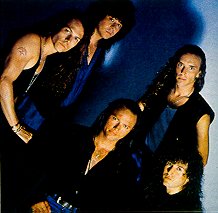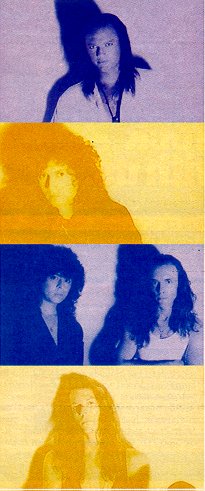


Queensryche has been labeled everything from glam to thrash; in reality the band has been not so quietly building its own empire of intelligent metal. DAINA DARZIN investigates the foundation.
Queensryche front man Geoff Tate is watching from the window of his temporary condo while sailboats and jet skis traverse Lake Geneva, Wisconsin. Everything's Technicolor-sunny and bright blue, a having-a-great-time-wish-you-were-here postcard you send to your mom. But Tate is grumpy.
"At the time of Operation: mimdcrime [Queensryche's 1988 release], I thought the power of music and the written word was very strong-that it could influence people," Tate says. "My general attitude still points in that direction, but there's also a helplessness. So many things need to be fixed-you could spend all your life worrying about it. But it takes a lot of people to make a change. I can do my bit and recycle and try not to drive my car every day, but it takes millions of people to make a difference. Nowadays, music is looked on merely as entertainment; there's no social significance. Rock'n'roll is worthless in that direction. So why bother?"
"Do me a personal favor," interjects guitarist Chris DeGarmo. "Don't make 'Rock'n'roll is - worthless' the first line of your article, please. I think music can have tremendous impact on people. It depends on how it's presented. There's always someone in song and art who digs into the innermost feelings of people. Not everyone writes the calculated message."
"You think people are going to go after Ronald Reagan and find out what really happened?" Tate retorts. (The songs on Mindcrime outline an alleged governmental conspiracy plot engineered by the Reagan administration.) Well, no, but months after this less-than-idyllic conversation, Queensryche has managed something almost as improbable. Empire has become a monster-certifiably huge-up there on the Billboard charts with Wilson Phillips and Vanilla Ice.
That's not all. Queensryche played Guns N' Roses Night at Brazil's Rock in Rio II megafestival last January. The band had never toured in South America and figured nobody would pay that much attention to them. But once Queensryche hit the stage, the down-in-front contingent-diehard fans who'd flown in for the occasion and native Brazilians alike-sang along with the verses of all the band's material. The band's Japanese tour was sold out. Its eerie dream-state of a ballad, "Silent Lucidity," is showing every sign of becoming the band's first bona fide hit single. In April, Queensryche began its U.S. tour, finally headlining arenas.
Mind you, the members of Queensryche are no strangers to arenas, though the ones they're used to playing are less auspicious than Rock in Rio. The band's been slogging around since the early '80s, warming up the headbangers for Ozzy and Kiss and Iron Maiden and AC/DC and Quiet Riot and Dio ... an interminable slew of 40-minute opening gigs that Tate always found frustrating as hell. "Basically, you're just trying to not get things thrown at you," he complained back in '86. "It's difficult when your lyrics are going over people's heads, when the audience is going,' What are these guys talking about?' "
Queenryche hails from Seattle, although the band is not signed to Sub Pop, a label that has become synonymous with bands such as Soundgarden, Nirvana, and others who typify the gloomy, angry sounds currently coming out of that city. But it does have more in common with that contingent in the attitude department than other West Coast metal bands.
At one point Queensryche thought that 45 minutes of quasifame would be its lot in life. The industry buzz was that the band was just too damn smart for its own good. A socially aware, high-tech, intellectual, nonsexist heavy metal band? This was product that was gonna move? Please. Tate insists he gets tired of the band's "thinking man's metal" tag but says dealing with uninformed music critics who assume all metal musicians are stupid, is worse.
"What upsets me is all the stereotypes," he grumbles. "How many times can you do, 'I'm a rebel, 1 don't care about anything'? The industry doesn't think the audience has any sort of intellect at all. They think, 'We know this works, so we'll sell 'em on it.' It's such a disgusting business."Tate does admit that "there was a time we were really into image and we failed miserably." Around the time of its second LP release. Rage for Order, the band thought they needed a visual image to propel the machine. "We went way out there," Tate says, "and there wasn't anybody to reel us back. Thus, we created the gothic vampire look, which we quickly realized was not very comfortable as a life-style. Putting on all the makeup and the hair spray-I like to refer to that as our glam period," he says with a laugh. The band played a few more arena opening slots, but the record didn't sell.
In 1988, Queensryche channeled all its residual pissed-off energy into Operation: mindcrime, an ambitious, complex "aural film" about a political assassin. The album served as a snarling indictment of just about everything wrong with the world. ("Religion and sex are power plays, manipulate the people for the money they pay / Selling skin, selling God, the numbers look the same on their credit cards.") Critics took notice, Queensryche opened for Metallica, and Operation: mindcrime went gold.
Empire adopts "more of a personal outlook- it's not so globally social," says DeGarmo. "The music was turbulent on Mindcrime, the mirror of a very turbulent time. But we've had a good last two years. We've found a bigger audience for those ideas that touched on political opinions. Mindcrime was a spectator seat to an event; this record is more like you're in the play. It's not as cynical."
But for Queensryche, this more personal LP still ends up filled with tales of a troubled world. The title track is about "the problems with Bloods and Crips and gangs in Seattle," says Tate. "It's about how tough it is for kids to find something to do with their lives when they're tempted with all the big bucks they can make selling drugs. How do you compete with five hundred dollars a day? The song's about the desperateness of the situation."
"Resistance" addresses the high cancer rate around what was formerly Washington State's Hanford nuclear plant from the point of view of the people living there; "Della Brown," according to Tate, "is the story of a homeless woman," the point being that "women in this country grow up with this fantasy dictated through the media that all you have to do is be beautiful and your life will be easy. So some girls never develop worthwhile skills that will help them. At a certain point, when you've got some wrinkles, what are you going to do?
"And rock'n'roll has exactly that image," he continues. "All the bimbos in the videos and young kids don't realize that's not reality-it's a formulated image that they're meant to buy. What do we feed kids? That drinking beer and partying is the way to go, when other countries are training their kids to be scientists, and we can't keep up with that. And science is what's going to influence the world."
"You think. Wake up kid, don't believe that's all there is to it," adds DeGarmo. "But that, to a young person, just sounds stupid. Sex will always sell, all this macho shit of the guy who's got the girl by a collar and leash-it's really degrading and stupid. It's not even stimulating sex. Sometimes you see a film that takes sex on a real emotional ride, not just the ups but the downs, that people can relate to, that's deep. But today's the time of instant information and commercials. You got thirty seconds, babe."
The ability to resist instant gratification is a quality Queensryche has always prized. "Everyone wants everything now. It's difficult to be patient for something you really want," DeGarmo says. When assembling the band [Tate, DeGarmo, guitarist Michael Wilton, bassist Eddie Jackson, drummer Scott Rockenfield-the lineup has remained the same from the beginning], "we were looking for people who shared the same sort of passion, who were willing to stick it out to get there." Even with its newfound success, the band's cautiously optimistic at best. "We've always tried to keep our expectations low, although we have a confidence about our work-we knew we were breaking new ground with each record.
"But if you try to second-guess public taste, if you do something that's not from the heart-if it's a commercial success, okay, though you sold yourself short internally," says DeGarmo. "But if it doesn't fly, you've failed in two directions. If we make a record we like-that comes from this intense passion for playing music-if no one buys it, at least you walk away with that."